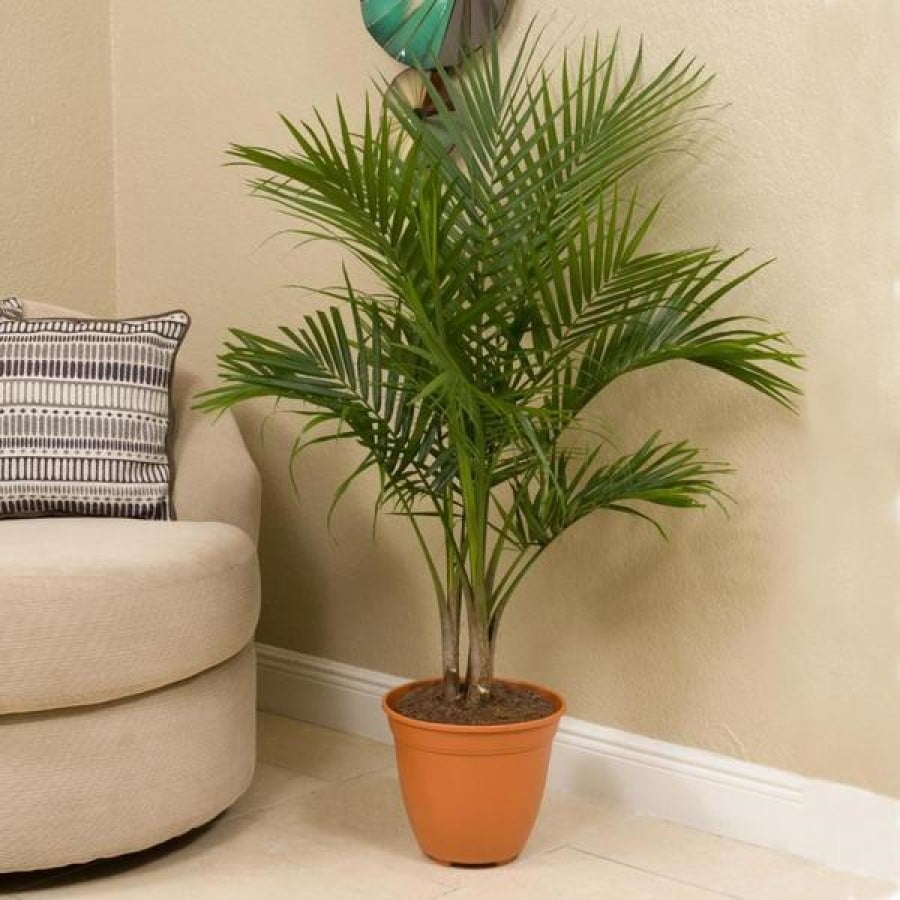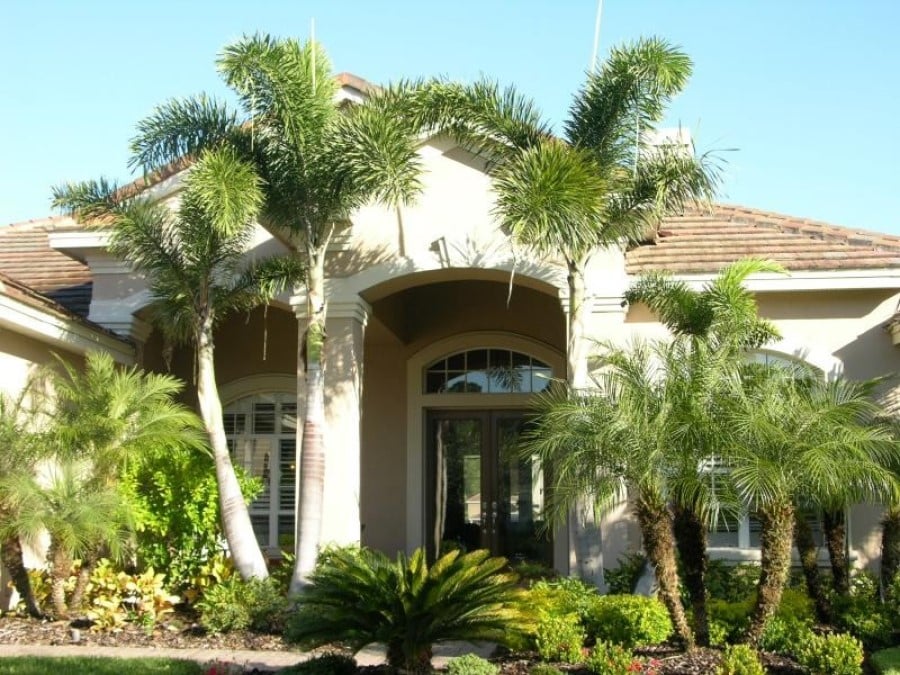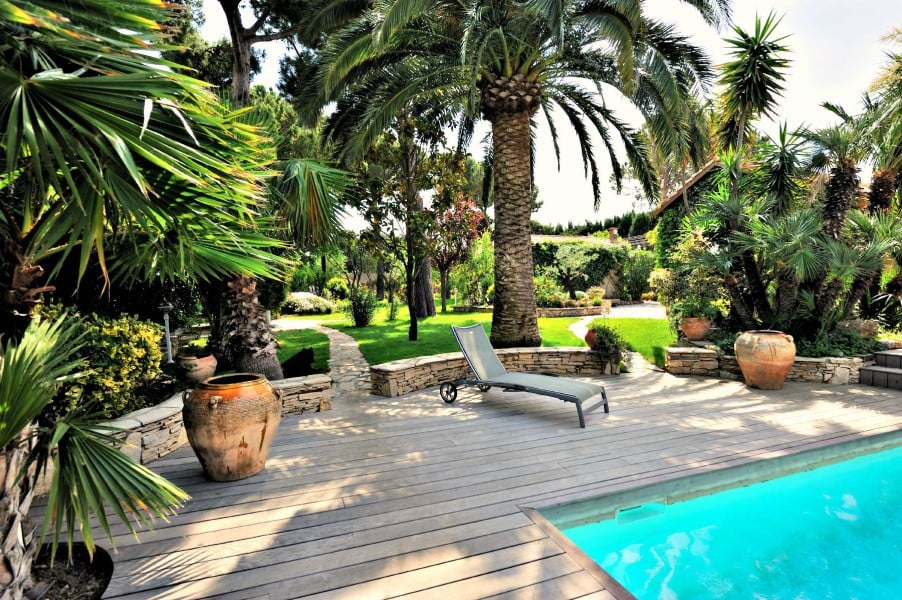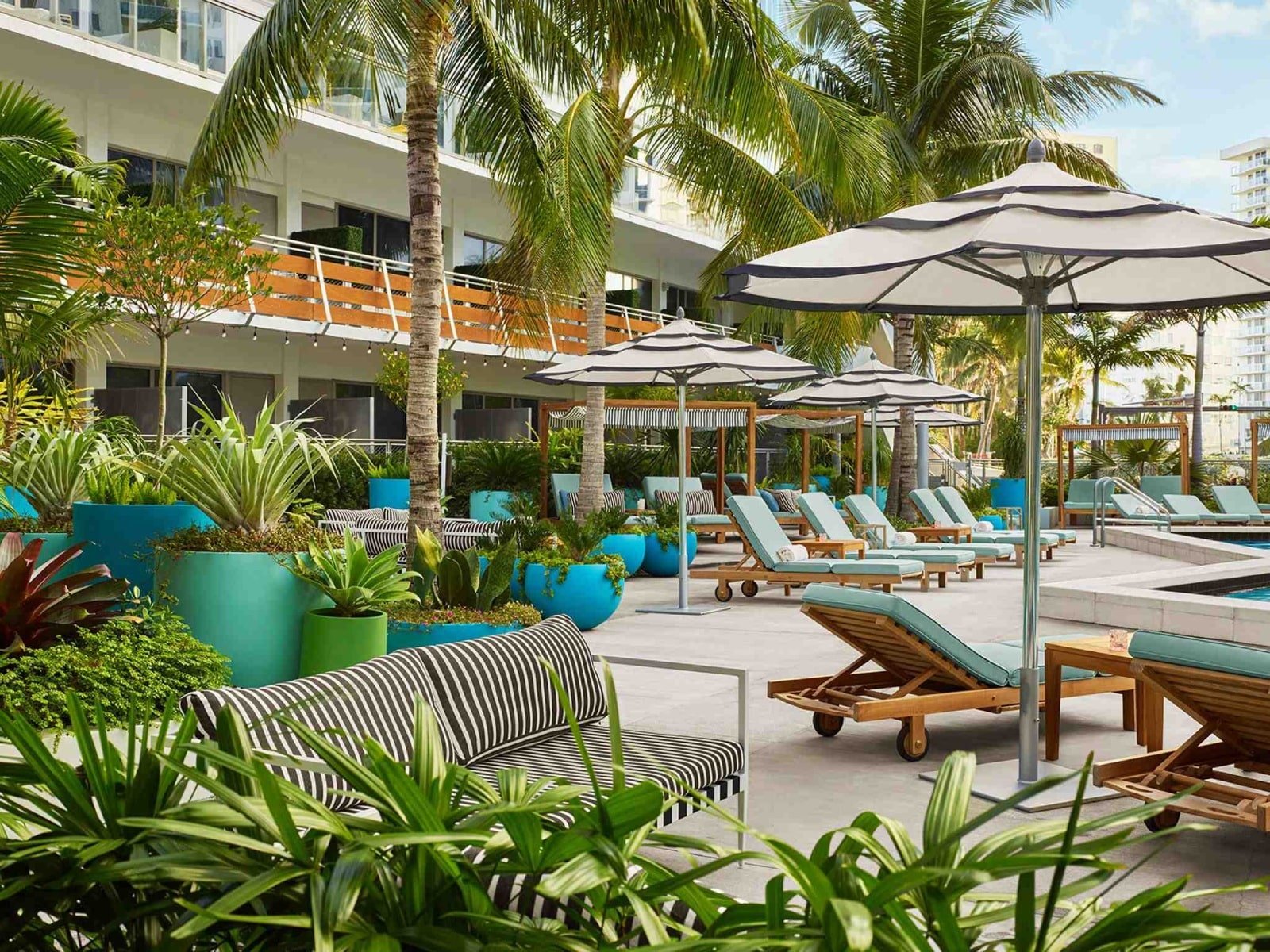Few things are as symbolic of paradise as palm trees are.
They create a sense of warmth and relaxation, even in cooler climates where they may not grow naturally. These tall, stately plants with their lush green leaves and long, curving fronds can seem like something out of a dream: an exotic destination just waiting to be explored.

And for gardeners across North America, palm tree landscaping is quite simply irresistible!
Palm trees make excellent additions to tropical landscapes, yards, and inside rooms. But they shouldn’t be reserved for solely for a tropical climate.
- What are the benefits of using palm trees in your garden, landscape, or indoor decor?
- Can you keep palm trees inside?
- Can you keep palm trees outside?
- What types of palm trees grow well in different climates?
- Where do you place a palm tree?
- How do you decorate indoors with a palm tree?
- How do you decorate a yard with a palm tree?
- How much is a palm tree for landscaping?
- How tall can a palm tree get?
- Which plants look good with palm trees?
- How do I select the best palm tree?
What are the benefits of using palm trees in your garden, landscape, or indoor decor?
If you’re looking for the best way to spruce up your home or business, try adding palm trees. Palm trees are one of nature’s most beautiful and affordable ways to add coastal landscape beauty without breaking the bank! Here are just some of their benefits:
- Save money on watering costs as most palm trees are very low maintenance, requiring minimal water consumption.
- Adding palm trees can be beneficial to your local bio-diversity because they provide food, cover and nesting areas for birds, butterflies and other local wildlife.
- Save money on landscaping maintenance costs when growing palm trees in pots as the roots are contained and won’t break apart your infrastructure.
- Save money on time, as you don’t have to weed trim around palm tree trunks
- Palm trees are an excellent Feng Shui choice creating peace and tranquillity for the home garden or commercial space.
- Add a tropical flair to an otherwise cold or wintery-looking area. A tropical paradise is just a few trees away!
- Indoor palm trees look stunning and can complete an interior design in an instant.
Can you keep palm trees inside?
Of course, you can.
There are many palm tree varieties that are smaller enough to keep inside. They need some special care and attention to thrive indoors, but in many cases, it’s easily done with the right knowledge and a little palm tree growing guidance.

These plants are really a lot like any other indoor tropical plant… they love light, they may need to be watered a bit more frequently than other plants, they prefer warm temperatures and they definitely appreciate some humidity.
Can you keep palm trees outside?
Depending on the climate, yes, you can!
While some palm species may display signs of damage when exposed to cold temperatures (especially if they have never experienced cold temperatures before), they should rebound and grow normally once the temperature returns to a more agreeable level.

If you are worried about the temperature, you can always bring your palm tree inside – if it’s small enough, and you are using a planter (highly recommended).
What types of palm trees grow well in different climates?
Many palm trees are native to arid climates while others are tropical and thrive in humid or wet conditions. Some varieties may be adapted to specific climates and hardy to cold conditions.
Make sure to pick a species that’s appropriate for the climate in which you live.
Palm trees that grow in almost any area
Zones 9 to 11
- Chinese windmill palm
- Screw pine (Pandanus tectorius)
- Pygmy date palm (Phoenix Roebelenii)
- Rhapis excelsa variegated wax plant (Hoya kerrii F.Muell.)
- Anything in the Arecaceae family

Best palm tree for full sun and warmer areas
Zones 10 to 11
Many species of palm do a great job in warm weather and don’t mind full sun. These sun lovers are:
- Coconut palm (Cocos Nucifera)
- Canary Island date palm (Phoenix Canariensis)
- Foxtail Palm (Wodyetia bifurcata)

Best palm tree for colder areas
Zones 7 to 11
A few palm trees are adapted to cooler climate conditions, though they prefer mild temperatures, they can tolerate temperatures as low -2 Celsius. Cold hardy palms include:
- Pindo Palm Tree (Butia capitata)
- Chinese Fan Palm Tree (Livistona chinensis)
- Mexican Fan Palm Tree (Washingtonia robusta)

Where do you place a palm tree?
Before you head out to purchase that palm tree, think about where you are going to put it. There are a few things to consider before you plant.
Will you place it in the ground or will you buy a pot? Indoors or out? Are the palms for decoration or are they for some other purpose?
Using a planter for your palm tree
If the palm tree is for decoration, you might want to consider a pot. If you want your palm tree indoors, you need a pot.
There are many different styles of pots that the palms can go in, and you don’t have to spend a lot of money on them if you don’t want to. You can of course turn an old barrel into a planter for your palm tree.

But the best idea is to invest in a planter that will last. Jay Scotts planters are made from fiberglass, which is light, strong, and durable. We also offer planter sizes for any kind of palm, big or small. To get an idea about the kind of planter that works for palms, have a look at our range.
How do you decorate indoors with a palm tree?
Minimalist palm decor
Lush greenery is the ideal complement to a contemporary home’s minimal decorating style. A prominent palm tree accent, especially a tall and statuesque silver Bismarck palm, is sure to create an intriguing, timeless feel.

Exotic decor
Other more brightly colored palms offer an exotic ambience to your living room. The softness of a Lady palm is a lovely accent to your decor. Or, a shiny green Kentia palm will add a bright splash of color, texture, and provide a focal point to your indoor landscape.

Bamboo palm plants are also an Instagram favorite.
Bold palm tree ideas
If you prefer something bolder, opt for the mighty Chinese Fan palm. Its slow-growing pinnate fronds look like a fan and is an instant show stopper when used in decor.

Palm trees of style and grace
As brilliant as they are beautiful, exotic palms offer an air of class and style not found in other plants. The modernist classic look of palm trees such as the Majestic palm (Ravenea rivularis) is a stunning choice for any home and ideal for decorating your home in a sleek, contemporary style.

Boho style palms
Areca and Caryota palms are bushy plants that add a lazy, tropical vibe to your home’s decor. These plants sport long leaves in a vibrant green color making them a bold statement piece while also inviting you, or your guests to plonk down on the sofa and relax.

Choose the right palm for your space
When choosing an indoor palm tree, look for one with smooth green leaves without any brown or discolored spots. It should also be well-branched and compact so that it doesn’t dominate the space. Indoor palms are slow growers, so choose a healthy plant.

How do you decorate a yard with a palm tree?
Use palms for shade
Palm trees are ideal for shade because of their broad leaves and tall trunks. Keep in mind that large palm trees can live up to 100 years old! If you intend to use your palm for shade, it’s best to plant your palm in the ground so they will eventually grow big enough.
Foxtail palms are a common shade favorite.

Smaller trees in pots are useful to provide a bit of shade for smaller plants rather than humans. Keeping your miniature palm in a pot means you can move it around the garden to provide cover for the plants that need it most.
Palm trees and privacy
Using palms for privacy is a common landscaping idea. If you’re looking for a natural way to screen your view. Plants like the Areca palm can grow over 20 feet with feather shaped leaves that are bushy enough to block out your neighbours.

If you really want a private space, plant palms in pots along the boundary of your property and then add a hedge and other shrubs in between to create more privacy.
Tiki Bars, pool areas and tropical landscape design
The tiki bar craze isn’t just for the beach! When you’re creating a tropical look in your yard or resort garden, beautiful palm trees are a great way to set up that tropical landscape.
You could even add Jasmine vines to your beautiful palms to add even more texture to their trunk. This climbing vine provides a nice contrast and draws attention all on its own.

If you really want to show off your trees as a focal point in your landscape design, place some spotlights under the leaf bases to highlight their beautiful fan-shaped leaves at night.
Leading with palms
Palm trees exude relaxation and invitation. Therefore, creating a row of two palm trees leading to your pool area or entranceways with a unified look makes a striking entryway whether it be for your home or your hotel.
Royal palms are a classic. With thick trunks and lush fronds of green, these beautiful palms are reminiscent of a Cuban villa. Royal palms grow very tall too – up to 70 feet!

Pro tip: When planting, make sure to leave enough room between the trunks for visitors to pass through easily, and for the roots of the palm to grow unobstructed.
Palms in your front yard
There’s no rule that says you can’t plant palms in your front yard! In fact, many homeowners choose to grow tall palms in their front yards. It gives them a striking garden landscape and signals to passersby that they must be happy.

Any palm tree will grow in the front yard, but if you want a spectacular display of landscaping ideas with palms, consider adding some impressive coconut trees as well!
Pro tip: Avoid planting the Queen palm. Its fruit often falls and creates a mess all over the street or your yard.
How much is a palm tree for landscaping?
You can purchase a young palm tree, which is under 6 feet, for between $25 to $300. For palm trees between 6 and 11 feet, expect to pay up to $575. Mature palm trees taller than 11 feet can cost up to $10,000. Of course, this largely depends on the variety of the palm tree.
The most expensive palm tree is the Coco de Mer. Its $10,000 price tag is due to its rarity and difficulty to cultivate.
You might consider an artificial palm tree if you are on a budget. They range in price (without the pot) from approximately $50 to more than $300. Some artificial palm trees look so realistic that it is hard to tell them apart from their living counterparts at first.
Then you need to consider a planter. It’s really important to invest in a good planter (ideally a fiberglass one) to ensure your palm is healthy and with a study planter, it won’t need to be repotted for a long time. Take a look at our store for an idea on premium planters.
How tall can a palm tree get?
The tallest palm tree on Earth is a species of palm called the “Wax palm” which comes in at 200 feet tall!
Most outdoor varieties can grow up to 20 feet tall, while most indoor palm trees only grow to around 10 feet. The Pygmy date palm, for example, tops out at about 3 feet.
Which plants look good with palm trees?
The best plants for a palm tree are those with similar requirements. Many palms require full sun, so if you’re looking to plant some greenery under your date or sago palm be sure they’ll enjoy the same environment. Some of the most popular include:
Ferns – These little guys look great at the base of the trunk, or intertwined and trailing from the trunk!
Shrubs – Shrubs work as a great foundation decoration for your palm in the yard. They are also used to fill in the gaps between trees to provide a divider in the landscape.
Jasmine vines – This creeping vine is iconic of coastal landscapes and palm trees. Introduce them to your tree and let them cover the trunk with fragrant flowers and trailing leaves.

Flowers -Favorites are white petunias, red begonias and geraniums. Really any tropical flowers that you can find at the local nursery or garden shop.
Orchids – These tropical and delicate beauties are great to plant in a hanging basket from the trunk of an outdoor palm tree. Or in the same pot as an indoor variety. Very tropical!
For indoor decor, or container gardening in the yard, planting your palm tree plant accessories in colorful containers makes a bold statement in your home.
How do I select the best palm tree?
For privacy palms, it’s a good idea to select the trees that are the same variety, have an equal height, and have the same number of leaves on each branch. This will ensure your privacy barrier is uniform.
For decoration, you might want to select varieties with different heights, growth speeds and fronds. You can also vary their color. This will give your garden some texture, excitement and draw attention to each plant.
If you plant trees of different heights, make sure to leave enough room between them for root growth. It’s also important to follow the spacing recommendations on the palm tree tag that is included in your package. It will tell you how far apart and deep in the ground they should be planted.

Palm trees are an exceptional addition to your home or commercial space. They can add an exotic atmosphere to any space they are in. In addition to adding a natural aesthetic appeal to your yard or indoor decor, you will also be able to use them as a privacy barrier or shade. Wonderful!
If you are ready to start palm tree landscaping, why not send us a quote. This is especially helpful for commercial projects with budget requirements needed ahead of time.
For expert advice on growing palms and other plants outside, download our guide.
